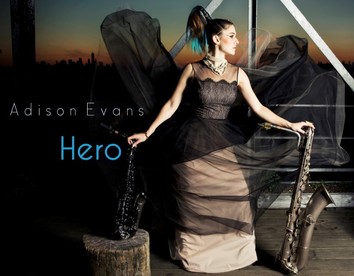
Her debut album Hero is in honor of those figures who have influenced and helped her throughout her life and career. She is joined by the talented and respected Matthew Jodrell on trumpet and flugelhorn, the brilliant Mathis Picard on piano, Dan Chmielinski on bass, Roberto Giaquinto on drums and Melanie Charles’s vocals on three of the twelve tracks. This is a great band—collectively called AEQ—and they are well-suited to bringing Adison’s vision to fruition. All but four of the tracks are composed by Adison and all of the tracks are arranged and produced by her.
Hero opens with Dropbear Boogaloo, a lively piece about the weird little creatures in the Australian outback that look like koalas but drop on your head from the trees.
Adison’s alto sax is a kick in her interpretation of the furry little monsters. Jodrell is as quick and bright as always. Together, they work a tremendous duet and Chmielinski’s bass in hopping and fun as are Giaquinto’s drums. It is a great introduction to the album.
Little Tulip is a waltz to herald the beginning of Spring. Right on time. Adison opens the track with warming baritone sax and is answered by the cool horn of Jodrell. Picard’s piano is sweetly understated. It is not so much a celebration as it is a relief that—finally!—Spring has arrived.
One nice surprise is from Lerner and Loewe’s Camelot. The piece, If Ever I Would Leave You, is arranged according to Sonny Rollins’ What’s New. Adison calls Rollins one of her musical heroes. The opening chorus of sax and trumpet is played percussively along with the rhythm section until the Frederick Loewe melody kicks in.
Again, the baritone sax takes on the main theme as the piano offers a point of view all its own. The rhythm section is in full swing, eventually moving into a bit of a Cuban rhythm which the horns adopt with great energy.
Blue is a Beyoncé original. Adison credits her hero Beyoncé with teaching her “much of the music business.” The lyrics are delivered beautifully by Melanie Charles. Picard and Adison carry the melody gently and create great space for the vocals.
Adison calls Steve Wilson’s The Epicurean her “favorite composition by one of the most inspiring saxophonists on the scene.” The piece is some of the coolest Jazz you ever want to hear. Adison and Picard work the melodies so effectively and respectfully as Chmielinski and Giaquinto keep things tight. Jodrell joins in for a fine solo, enhancing the melodic lines. Giaquinto gets an inspired solo that he uses to beautifully set up the horn and piano conclusion.
Open Your Eyes is a reminiscence of Adison’s time spent in Siena, Tuscany. The delicate piano introduction is brief but lyrical. The bass then horns join the reverie of memories and sights enjoyed in a lovely landscape. Picard’s piano offers quick runs and bright colors and paints a beautiful watercolor that is brushed again by the flugelhorn and alto sax. This is a fine, fine piece.
Stevie Wonder’s Ribbon in the Sky has all that Stevie offers. Giaquinto and Chmielinski step off with a funky bit of rhythm and are joined by Adison and Jodrell to bring the easily-recognized melody to life. Picard picks up the melody and the three carry it together. Adison’s baritone is cool and funky at once. It is a great tribute to everyone’s hero, Stevie Wonder.
Mama is dedicated to Adison’s first and constant hero. Melanie Charles warmly intones the sentiments felt by Adison. The piano is the sole instrument that accompanies Melanie. The song is painfully but meaningfully short. Adison expresses so little in sweet acknowledgment that she could never say enough to whom she owes so much. Lovely.
Respirare (To Breathe) is Adison’s remembrance of running through the Tuscan landscape. Each of the instruments carry forward the various elements of the experience. The running drums, the heavy breathing of the bass, the landscape of trees, hills, the blue sky all borne aloft by the exquisite baritone and thrilling piano. They all come together in one experience. Adison says that it is “the closest I have ever felt to God.” And if meditation is breathing in and breathing out, then why not?
Do What’s Best for You is the constant counsel Adison keeps in managing the everyday decisions of the musician’s life of travel and home—so many choices. Melanie Charles’ vocals serve as the ongoing reminder of the guiding principle required of artists everywhere. Adison’s alto sax is full of determination and dedication. The lilt of the rhythm and vocal phrasing reveal the back-and-forth nature of eternal crossroads.
Prayer for Yoshi is the lament over the loss of a dear friend who brought strength and wisdom into Adison’s life. The prayerful, yet mournful, baritone sax causes us to witness and, perhaps, share in the grief. The trumpet is like the call of the archangel but also serves as the bridge into Never Forget to Say Thank You.
This, the final song of the album, is a reminder to express gratitude in the way that Yoshi taught Adison. In fact, as Adison states in the liner notes, “One of the greatest lessons instilled upon me from my dear friend, Yoshi. To those who support this music; To those who find grace, beauty and love in all that you do, especially in a world in so need of more love and compassion, You are my hero.”
It is a fine thing to offer thanks and honor to those who have paved a path on a debut album. It speaks of character and nobility. The ending notes of the album are a loving coda to all of those whom Adison Evans would call Hero.
~Travis Rogers, Jr. is The Jazz Owl
 RSS Feed
RSS Feed
